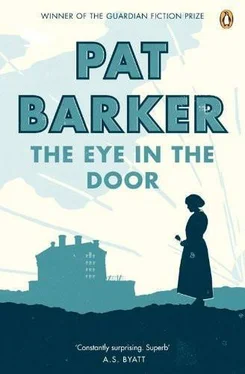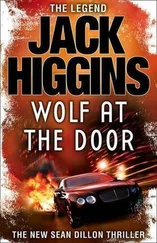‘She’d not notice the difference,’ somebody said.
A good-natured scuffle. Then a new voice: ‘Did you hear the one about Lord Albemarle? Went into the Turf, and said…” A desiccated, aristocratic bleat. ‘“Keep reading in the papers about this Greek chap, Clitoris. Anybody know who he is?”’ They all laughed, the younger lad with braying anguish; it was immediately clear his confusion at least equalled Lord Albemarle’s.
Dundas came back with the tea and two very greasy doughnuts.
‘Not for me, thank you,’ Rivers said, patting his stomach. ‘I have to be careful.’
Dundas nodded uncomprehendingly. Obviously duodenal ulcers and having to be careful were a million miles away from his experience. He ate both doughnuts with every sign of relish. Rivers sipped his tea and tried not to think that if Dundas’s medical records were anything to go by (my God, they’d better be!) he could expect to see the doughnuts again before long.
They didn’t talk much. Dundas was too tense, and Rivers respected his need for silence. When they’d finished, they walked across to the hangars together. Dundas disappeared inside the first hangar for a moment and came back carrying flying helmets, jackets and gauntlets. Rivers put a jacket on and followed Dundas across to the aeroplane.
‘Here she is,’ Dundas said, patting the fuselage. ‘Terrible old bucket. Can’t think why they’ve given us this one.’
Because it’s the one they can best afford to lose, Rivers thought. He’d intended this reflection as a small private joke, but instead it brought him face to face with his own fear.
‘Right,’ Dundas said. ‘If you’d like to hop in.’
Rivers climbed into the observer’s seat and fastened the harness. Dundas bent over him to check the buckles. A faint smile acknowledged the reversal of the usual caring role. ‘All right?’ he said.
‘Fine.’
‘You’ve done a lot of flying, haven’t you?’
‘I don’t know about a lot. Some.’
‘But you’ve done spins and loops and things?’
‘Yes.’
Dundas smiled. ‘That’s all right, then.’
Something about Dundas’s smile held Rivers’s attention. Suddenly, he felt certain Dundas was withholding something, even perhaps concealing it. Not malingering. In fact, rather the reverse. He thought Dundas might be minimizing his symptoms. It wasn’t a good moment for that particular perception to strike.
Dundas pulled his helmet on, climbed in, exchanged a whole series of shouts and waves with the mechanics. The engine stuttered, began to roar, and then they were taxiing away from the hangar.
Rivers looked round him, at hedgerows thick with blossom, a sky tumultuous with rising larks; then he snapped his goggles into place, and the splendour contracted to a muddy pond.
He was now definitely afraid. The situation might almost be regarded as a small experiment, with himself as the subject. The healthy reaction to fear in a normal human being is the undertaking of some manipulative activity designed to avoid or neutralize the danger. Provided such activity is available, the individual ought to be unaware of feeling fear. But no such activity was available. Like every other man who sits in the observer’s seat, he was entirely dependent on his pilot. And what a pilot. He had long believed that the essential factor in the production of war neurosis among the two most vulnerable groups, observers and trench soldiers, was the peculiarly passive, dependent and immobile nature of their experience. It isn’t often that a hypothesis conceived in the scientist’s cortex is confirmed by his gut, but his gut certainly seemed to be doing its best to prove this one. He bit his lips to control the pain and concentrated hard on the back of Dundas’s head, at the wisps of reddish-gold hair escaping from beneath the helmet, the pink neck, the edge of white scarf, the brown leather of his flying jacket, scuffed and scarred with wear.
‘ALL RIGHT?’ Dundas yelled.
They had reached their take-off position. The engine raced. Rivers felt himself pushed hard back against the vibrating seat. The plane lifted, bumped, lifted again, and then climbed steeply away from the huddle of buildings.
He looked over the side, shielding his mouth from the wind. The countryside stretched below them, grey striations of lanes and roads, the glitter of a pond, great golden swathes of laburnum, a line of hedgerow white with blossom, blue smoke from a bonfire drifting across a field of green wheat.
A movement from Dundas brought him back to the task in hand. Dundas was making a spinning movement with his hand. The comforting roar of the engine faltered, then became an infuriated mosquito whine as the plane started to spin. Dundas’s eyes were fixed on his instruments. Rivers watched the sun revolve in a great spiral round the falling plane. Abruptly, the sun vanished, and the green fields rushed up to meet them. Dundas pulled on the stick, but something was wrong. The horizon was tilted. Rivers leant forward and tilted his hand to the left. Slowly the horizon straightened.
Dundas had lost his sense of the horizontal. Already.
‘HOW WAS IT?’ Rivers yelled.
Dundas waved his hand in an incomprehensible gesture, then put one hand on top of his head and pressed repeatedly, indicating he’d felt his head being squashed into his body. He made the spinning movement again. Rivers shook his head and made a looping movement. After a moment’s hesitation, Dundas’s thumb went up.
The plane banked steeply as Dundas turned and made for the city. He was not meant to do this, and Rivers guessed he was trying to make the flight last as long as possible. In a short time he saw beneath him the sulphurous haze of London. This was the view seen by the German pilots as they came in on moonlit bombing raids, following the silver thread of the Thames, counting bridges, watching for the bulge of the Isle of Dogs.
Rivers tapped Dundas on the shoulder. Dundas turned round and nodded. So much of his face was hidden by the goggles it was impossible to read his expression. Rivers sat back and again concentrated on his own sensations. After the fifth loop he began to feel he was loose in his seat, a reaction he remembered from other flights and knew to be a frequent, though not universal, reaction of healthy fliers. They again came out with one wing down. Dundas leant over the side and retched, but didn’t vomit. Rivers jerked his thumb at the ground, but Dundas ignored him.
With no idea at all now which manoeuvre to expect, Rivers sat back and tried to relax as the plane climbed. The vast blue haze of London fell away beneath the left wing-tip. Higher and colder. Wisps of cloud hid the sun; columns of shadows flitted rapidly across the city. Rivers felt calm, suddenly. There were worse ways to die, and he’d seen most of them.
Again the engine faltered, giving way to the mosquito whine as the plane began to fall. Dundas came out of the spin, white, giddy, confused and clearly finding it difficult to focus on his instruments. Rivers could see him peering at them. He yelled, ‘DOWN!’ and jerked his finger at the ground. Dundas leant out of the plane and was sick.
They had a bumpy landing, though not worse than many others Rivers had experienced. After the plane had taxied to a halt, Dundas stayed in his seat for a few moments before jumping down. He staggered slightly and held on to the wing. Rivers climbed down and immediately went up to him.
‘I’m all right,’ Dundas said, letting go of the wing.
Two mechanics were walking towards the plane. Dundas turned to them and made some comment on the flight. The three went into a huddle, and Rivers walked to one side. Dundas was smiling and talking cheerfully, but then Dundas was a very good actor.
When he came across to join Rivers, he said, ‘Sorry about that.’
Читать дальше












